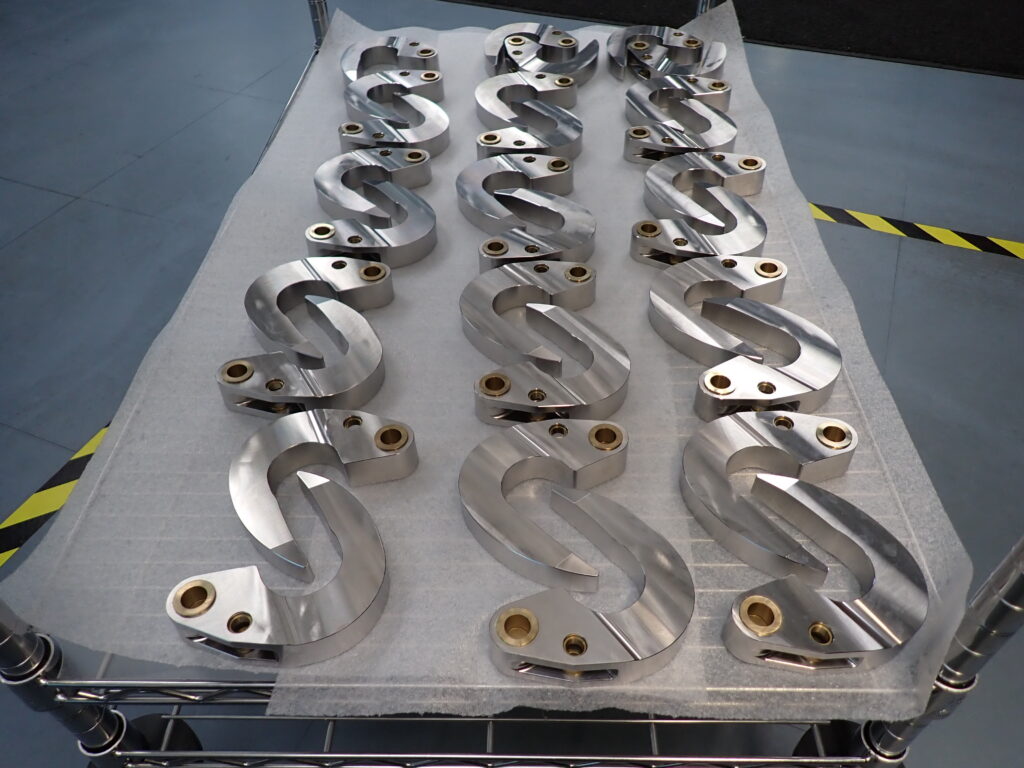What Are Pallet Machines?
In manufacturing, pallet machines play a big role in making production faster and more efficient to improve machining automation. These machines hold and move parts automatically during machining. Instead of stopping a machine to load a new part, pallet machines swap parts quickly, keeping production going.
Machining automation helps companies reduce downtime, improve accuracy, and produce more parts in less time. Shops that use pallet machines can run longer hours, even overnight, without needing workers to be present. This is called lights-out manufacturing—machines keep working while the shop is closed
Many industries, like aerospace, automotive, and medical manufacturing, now rely on pallet machines to meet demand. More companies are using machining automation. This helps them stay ahead of their competitors. They can make high-quality parts faster and at lower costs.

The Benefits of Pallet Machines in Manufacturing
1. More Parts, Less Downtime
One of the biggest challenges in machining is downtime—when machines sit idle while workers change parts. With pallet machines, this problem is reduced. Instead of stopping the machine to switch parts, the system does it automatically, keeping production running.
This means:
-
- Less waiting, more machining – Machines work longer with fewer stops.
-
- Faster part changes – Pallets move parts in and out quickly.
-
- Higher output – More parts are made in less time.
By using machining automation, companies increase efficiency and get more work done each shift.
2. Improved Efficiency and Workflow
When machines run without long stops, production becomes smoother. Pallet machines allow workers to set up multiple parts at once, so they don’t have to keep checking on the machine.
With machining automation, companies see:
-
- Better planning – Jobs are scheduled and completed faster.
-
- Less manual labor – Workers spend less time loading and unloading parts.
-
- More consistency – Each part is made the same way, every time.
3. Lights-Out Manufacturing – Running Machines 24/7
One of the best things about pallet machines is the ability to run machines overnight or during breaks. This is called lights-out manufacturing—production continues without needing workers on-site.
The benefits include:
-
- More production hours without extra labor costs.
-
- Machines make parts overnight, ready for workers in the morning.
-
- Less need for night shifts, reducing labor expenses.
4. Less Manual Labor, More Skilled Work
Machining automation reduces the need for workers to do repetitive tasks, like changing parts by hand. Instead, they can focus on programming machines, improving quality, and solving problems.
This makes work:
-
- Less tiring – Workers don’t spend all day loading parts.
-
- More interesting – They use skills for planning and problem-solving.
-
- Safer – Less handling of heavy parts reduces the chance of injury.
5. Cost Savings and ROI
Every company wants to reduce costs while improving quality. With pallet machines, shops save money because:
-
- Less downtime means more parts per shift.
-
- Workers focus on high-value tasks instead of loading parts.
-
- Machines run longer, reducing the cost per part.
Investing in machining automation may cost more at first. However, it quickly pays off by reducing labor costs and boosting production.
How Pallet Machines Fit Into a Modern Shop
1. Pallet Machines Integrate With CNC Machines
Pallet machines work with CNC mills, lathes, and multi-axis machines, helping them work faster and with fewer stops. Instead of one part at a time, a machine can swap pallets and keep going.
2. Compatibility With Robotics & Machining Automation
Many shops add robotic arms and automated tool changers to work alongside pallet machines. This creates a fully automated system where machines load parts, cut them, and move them down the line without human help.
3. Scalability – Growing With Your Business
As companies grow, pallet machines make it easier to handle larger orders. They work for:
-
- Small-batch jobs that require flexibility.
-
- High-volume production that needs speed and efficiency.
-
- Shops looking to expand without adding more workers.
How Machining Automation Affects Different Industries
Machining automation is changing the way industries produce parts. Companies that use pallet machines can make better parts, faster, and at lower costs.
1. Aerospace & Defense
-
- Pallet machines ensure high precision and repeatability.
-
- Machining automation helps meet strict aerospace standards.
2. Automotive & Transportation
-
- High-volume production requires fast part changes.
-
- Pallet machines reduce labor costs and improve consistency.
3. Medical & Healthcare
-
- Medical parts need flawless accuracy.
-
- Lights-out manufacturing helps keep up with demand.
4. Industrial & Heavy Equipment
-
- Large, complex parts benefit from automated workflows.
-
- Machining automation reduces downtime for faster turnaround.
5. Energy & Electronics
-
- Pallet machines improve efficiency in circuit board and energy component manufacturing.
-
- Reduces human error in small-scale precision work.
Why More Shops Are Adopting Machining Automation
-
- Demand for faster production and lower costs is growing.
-
- Worker shortages make it harder to find skilled labor.
-
- Customers expect quick delivery and consistent quality.
-
- Investing in pallet machines helps companies stay competitive and efficient.
Krukemeier – Your Partner in Machining Automation
At Krukemeier Machine & Tool, we use pallet machines and automation. This helps us make high-quality parts faster and more efficiently. Our lights-out manufacturing process means we can make precision parts overnight, helping customers meet tight deadlines.
Whether you need a single prototype or a large production run, our advanced automation guarantees quality. It also lowers costs and shortens lead times.
Looking to improve your production? Let’s talk.
